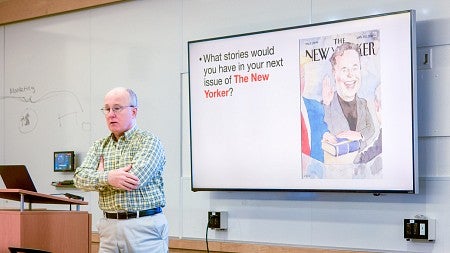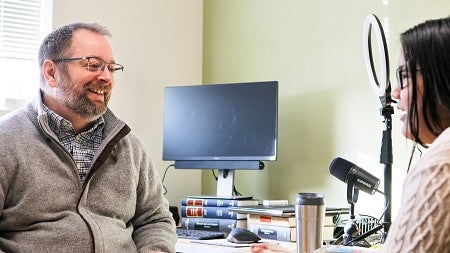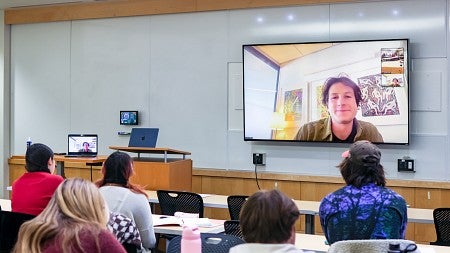Smaller classes, hands-on experience, and research opportunities give students in the SOJC Honors program an edge.
Story and photos by Ethan Donahue, class of ’26
Students looking for smaller, interdisciplinary classes, hands-on preparation to excel in their post-college careers and experience conducting in-depth research projects should consider applying for the two-year SOJC Honors program.
The SOJC Honors program offers high-achieving students an innovative academic journey. Through its interdisciplinary approach, the program blends rigorous coursework, innovative research and individualized mentorship to prepare students for their future endeavors, whether academic or career-focused.
“The SOJC Honors program gets students comfortable reading and translating academic works, which, apart from science communication classes, isn’t a big focus in our school,” said journalism major Nate Wilson ’24. “We learn how to write different types of stories, how to interview someone effectively, how to find different types of information and so on. Being able to understand and convey something that’s confusing on its face is quite important, especially considering our current information environment.”

What are the SOJC Honors program advantages?
The program stands out for its flexibility and emphasis on both academic research and professional practice. It invites students from all SOJC majors — advertising, journalism, media studies, and public relations — to engage in small, discussion-driven courses. Students can take advantage of four key components of the program: specialized coursework, an interdisciplinary cohort, individualized mentorship and the opportunity to complete a thesis or terminal project.
The SOJC Honors program spans two years — one year focused on coursework and the second dedicated to completing a thesis or terminal project. Incoming seniors can consolidate the program into a single year. The course work consists of three classes exclusive to the Honors cohort, Honors Media Theory and Research (J 315H) and two Special Topics in Media Theory and Research (J424H) classes. Honors Media Theory and Research is a foundational course that introduces students to central theories and methods of communication and media research.
The two J 424H course topics vary from year to year and are intended to closely examine and analyze contemporary issues in media and communication. For example, Professor of Practice Charlie Butler is teaching about The New Yorker. This is Butler’s first year teaching an honors course, which he views as an opportunity to expose students to exemplary journalism and interactions with accredited professionals.
“My main goal is to help students appreciate the depth and variety of great storytelling, such as that found in publications like The New Yorker,” Butler said. He wants students to leave with the ability to emulate the magazine’s rigorous research and narrative style within their own focus.
What goes into the honors thesis?
Students develop a thesis or terminal project under the mentorship of an SOJC faculty member, and it represents a capstone for their academic journey. Honors students take a Thesis Prospectus (JCOM 410) class the year they defend their project to ensure they are supported during the developmental stages of their thesis work.

Bryce Newell, the program’s director, says the thesis allows students to create a project that reflects their long-term goals and interests in a way they can highlight in their portfolio.
Students can creatively format their thesis. Some lean toward traditional formats, such as research papers on climate change communication or on internal communication channels at PR firms. Other projects are better classified as creative projects, such as documentaries or magazines.
“Producing a thesis project has expanded and created a portfolio piece for me to demonstrate technical skills. It also shows a finished work that will be instrumental in my future career,” said Eden McCall ’24.
Why choose the SOJC Honors program?
Gracie Del Rosario ’24 said she applied for the SOJC Honors program because of the smaller class sizes and more personalized class topics. “I enjoy having the opportunity to introduce my perspectives and interests to a classroom, which pairs perfectly with working on my thesis,” Del Rosario said.
For students aiming to challenge themselves and make the most of their undergraduate experience, the SOJC Honors program offers many advantages. Beyond its academic benefits, the program aims to instill confidence, self-direction and a commitment to excellence — invaluable qualities in today’s ever-changing, fast-paced media world, Newell said.
“[This program] is about more than earning honors; it’s about fostering creativity and a deep understanding of research,” Newell said. “Whether the aim is going to graduate school or into your career, the skills gained here will set you apart.”
Sally Garner, senior director of the Undergraduate Student Success Center, said the program’s thesis allows students to come up with a big question, develop a plan to break it down, complete primary and secondary research and present their findings. This process provides students with a highly transferable skill set for future endeavors that prospective employers will look for.

Small cohorts that max out at 22 participants ensure that students develop a tight-knit, supportive community. Having the four SOJC majors attending classes together beyond introductory courses is uncommon and allows honors students to “connect and build lasting relationships,” Newell said.
Students who graduate with honors also gain an edge in the highly competitive communication marketplace. SOJC Honors graduates have landed jobs at advertising agencies including Wieden+Kennedy, news and media organizations such as The Wall Street Journal and RePlay Magazine, public relations firms like Maxwell PR and communication teams at companies like Intel.
What are the application process and requirements?
Eligibility for the program requires a minimum GPA of 3.5 or good standing within the UO’s Clark Honors College. The program is designed for incoming juniors, but incoming seniors and sophomores will be considered on a case-by-case basis.
Applicants must submit a 500-word statement explaining why they want to be part of the program and what they expect to contribute, a 2- to 8-page writing sample and two faculty references. The writing sample should reflect the student's writing, research and critical-thinking skills. A research paper for an SOJC course is preferred, but any research paper is acceptable.
Applications open in February and close in mid-April. For more information, contact Bryce Newell or Sally Garner.
Ethan Donahue is a journalism major with a double major in history. He is part of the School of Journalism and Communication’s direct-admit and honors programs. He is also part of the Clark Honors College. He holds an interest in investigative and conflict journalism and is working on a thesis focusing on how journalism, propaganda and the U.S. government interact during conflicts.
